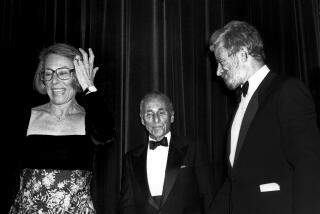Silver Lake Scholar Tackles Will Rogers’ Legacy : Literature: A nationwide search leads to Arthur Wertheim of UCLA. He will edit 10 to 12 volumes of the folk hero’s writings.
- Share via
Riding a crest of renewed interest in the life of an American folk hero, the Will Rogers Memorial Commission in Claremore, Okla., is embarking on a new publication of Rogers’ writings.
A nationwide search for a scholar to edit the mammoth project recently ended in Silver Lake, where the commission found Arthur Wertheim, a history writer whose professional focus had already been narrowing around the milieu of the beloved humorist and entertainer.
For Wertheim, 55, now employed as a writer in UCLA’s division of public affairs and development, the assignment marks the high point of a career and is “one of the most exciting opportunities a scholar could ever want.”
The 10- to 12-volume publication is expected to take six or seven years to complete and will require Wertheim to commute between Claremore, the birthplace of his subject, and Silver Lake several times each year to assist in the organization of the materials. The commission is providing Wertheim with an apartment in the Tulsa suburb for his use during the trips.
The commission received and matched a $158,800 grant from the Sarkeys Foundation in Norman, Okla., to help pay for the project. Starting in 1993, the University of Oklahoma Press will publish two volumes a year until the project is completed.
Wertheim, a Fulbright scholar who spent seven years as an assistant professor of history at USC before joining UCLA in 1984, was selected out of hundreds of applicants nationwide for the prestigious position.
“We struck academic gold getting him,” said Joe Carter, commission director. “He was the brightest applicant in a sea of jewels. I thought this might be an impossible task until I met Arthur.”
Wertheim accepts the enormous challenge the project poses. When finished, the volumes will provide a chronological look at Will Rogers’ life through his writings, illustrating the growth and development of one of America’s most famous social commentators, adventurers and armchair philosophers, Wertheim said.
“What made Rogers so tremendously popular was his ability to put complex issues into simple terms,” Wertheim said. “Rogers can still be read today because his writings reflect the constants in American society--human values and traditional American values like honesty, integrity and neighborliness.”
Wertheim is now compiling a separate, one-volume anthology of writings by Rogers also to be published by the University of Oklahoma Press within the next year.
Carter said both the anthology and comprehensive project will capitalize on a recent resurgence of interest in Rogers’ life. He cited the scheduled May 1 premiere of “The Will Rogers Follies” at the Palace Theater in New York City and the recent video release of four Rogers films as examples.
As a result of his studies in early 20th-Century America, Wertheim said, he was immediately attracted to Rogers because of the diverse life that he led and his embodiment of American folk culture.
“Rogers’ career reflects both the history of American popular entertainment and the passing of the American frontier,” Wertheim said. “From Wild West shows to vaudeville, to the Ziegfeld Follies, radio and film, Rogers was always seeking new and exciting opportunities.”
Wertheim said Rogers’ love of the frontier also cost him his life. In 1935, Rogers was killed when his plane crashed near Point Barrow, Alaska, during a flight to establish a polar air route to the Far East.
“I think he viewed aviation as a last frontier of sorts,” Wertheim said.
After finishing high school, Rogers embarked on a series of treks around the world. His first stop was Argentina where he worked as a cowhand. From there he traveled to South Africa, New Zealand and Australia where he starred in Wild West shows performing rope tricks that he had learned as a boy on his father’s cattle ranch in Oklahoma.
“Each of these countries had their own frontiers in the early 1900s,” Wertheim said, describing Rogers as a restless person who was always seeking new experiences.
The first volume of writings will begin with letters penned by Rogers in 1893 as a 14-year-old, Wertheim said. Future volumes will feature letters written to friends and family during Rogers’ travels abroad, including articles that he wrote for Oklahoma papers from places such as Auckland, New Zealand, and Durban, South Africa.
A majority of the written works, however, come from syndicated columns Rogers wrote for American newspapers on a weekly basis from 1922 to 1926 and his Daily Telegram column written from 1926 to 1935, the last of which he wrote the day before his death.
Carter estimates that there are more than 2 million words of written material that Wertheim and commission staff members will pore over during the next few years.
The commission hopes to compile a complete database using computer scanners and data entry that will help facilitate the editing process that Wertheim hopes to do at UCLA.
“Fortunately, we live in the age of computers, which will help me do this more quickly,” Wertheim said.
Wertheim received his Ph. D. from New York University and has already published three books. His book “Radio Comedy,” also published by the University of Oklahoma Press, features a chapter on Rogers’ early work in radio.
Wertheim and his wife Carol, a social science teacher at Glendale’s Roosevelt Junior High School, have a son and have lived in Silver Lake since 1975. He credits his selection for the project to past work on Rogers and his knowledge of early 20th-Century America.
Through this project, Wertheim will undoubtedly become one of the foremost authorities on the life of Will Rogers. Carter expects that Wertheim will produce an outstanding set of books that will be very much respected in both the literary and academic communities.
“We were fortunate to find this man,” Carter said. “He can look proudly at what he’s about to do and what he will give to the memory of Will Rogers.”
Wertheim is more modest about his role in chronicling the history of one of America’s great personalities.
“I’m just one of the many people who love Will Rogers,” he said.
More to Read
Sign up for our Book Club newsletter
Get the latest news, events and more from the Los Angeles Times Book Club, and help us get L.A. reading and talking.
You may occasionally receive promotional content from the Los Angeles Times.










